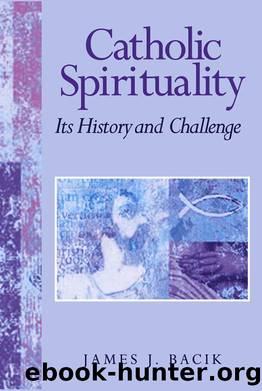Catholic Spirituality, Its History and Challenge by James J. Bacik

Author:James J. Bacik [James J. Bacik]
Language: eng
Format: epub
Tags: REL015000
ISBN: 9781616432188
Publisher: Paulist Press, Inc.
Published: 2013-02-13T16:00:00+00:00
5.
Prayer of Petition
When he was seriously ill in 1996, the well-known astronomer Carl Sagan told friends who were praying for his recovery that he wanted proof, not prayers. Sagan, who died later that year, was looking for strict scientific proof that there is a God who responds to our prayers. Earlier in his life he found comfort in the belief that God was watching over him âlike a benign parent.â But, influenced by his scientific training, he gradually abandoned this belief because the evidence supporting it was only âanecdotal.â He argued that petitionary prayer addressed to a Deity who is all-knowing, all-loving and all-powerful makes no sense. An omniscient God does not have to be reminded of our concerns; a truly benevolent Lord should not require encouragement to help us in our needs, and an omnipotent Father would not allow so much suffering to befall those who turn to him in prayer. Carl Sagan represents a modern skepticism that rejects religious practices, including prayer, as infantile and unenlightened.
Among believers we also find reservations about the propriety and efficacy of petitionary prayer. Some are leery of asking for favors because it seems self-serving or smacks of narcissism. Some fear that seeking help can easily turn into a form of magic that attempts to manipulate God. Others have ceased praying because their requests never seem to be answered. In addition, the world of theology sometimes raises questions for ordinary Christians about petitionary prayer. By insisting that immutability or unchangeableness is a divine perfection, classical theology makes it difficult to understand how God responds to our requests for help. Contemporary theology challenges a popular understanding of prayer when it rejects the whole notion of a God who intervenes periodically in human affairs.
Despite these objections and challenges, a high percentage of American adults continue to ask God for help. According to a poll reported in the March 31, 1997, issue of Newsweek, 87 percent of Americans say they believe that God answers their prayers at least some of the time; 85 percent accept Godâs failure to grant their prayers; 82 percent ask for health or success for a child or family member; and 79 percent pray for strength to overcome personal weakness. Jews, Christians and Muslims who pray to the one God are following the example of Abraham, their father in faith, who bargained with Yahweh to spare the wicked city of Sodom for the sake of ten upright citizens. Christians share with Jews the great treasury of psalms, which boldly ask the Lord for all manner of favors: personal health, a long life, deliverance from captivity, security from persecutors, strength against temptation, forgiveness of sin, guidance for the young, victory in battle, food for the hungry and even cruel punishment for enemies. For Christians, the example of Jesus serves as the ultimate justification for petitionary prayer. He beseeched his Father that the chalice of suffering might pass him by, and he cured the daughter of the Canaanite woman who refused to take his reluctance for a final answer.
Download
This site does not store any files on its server. We only index and link to content provided by other sites. Please contact the content providers to delete copyright contents if any and email us, we'll remove relevant links or contents immediately.
What Is the Gospel? (Foreword by D. A. Carson) by Greg Gilbert(781)
Daily Strength: Devotions for Bible Believing Study by Douglas Stauffer & Andrew Ray & Rick Quatro(746)
Veritas: A Harvard Professor, a Con Man and the Gospel of Jesus's Wife by Ariel Sabar(641)
New Morning Mercies by Tripp Paul David(640)
The Practice Is the Path by Tias Little(630)
Christian Ethics by Wilkens Steve;(571)
Cleaning Up Your Mental Mess by Dr. Caroline Leaf(544)
Greatest Mystery in the World by Og Mandino(540)
2084 by John C. Lennox(434)
The Creative Call by Janice Elsheimer(433)
No More Christian Nice Guy by Paul Coughlin(430)
Our Appointment with Life by Thich Nhat Hanh(425)
This One Wild and Precious Life by Sarah Wilson(417)
The Duties of Parents by J.C. Ryle(414)
Monastic Archaeology by Unknown(407)
A Closer Talk with God: Scriptural Prayers for Women by Kim Trujillo(381)
The Tale of the Tardy Oxcart (Swindoll Leadership Library) by Swindoll Charles R(371)
Jesus and the Lost Goddess by Timothy Freke(360)
I AM THAT I AM: 365 Daily Meditations by Nadine Sabulsky(359)
